新概念英语第三册语法总结及模拟题:特殊及习惯英语用法
新概念第三册语法总结
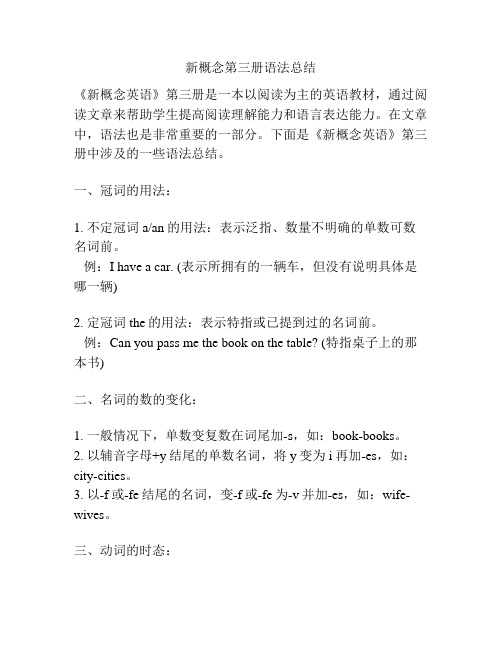
新概念第三册语法总结《新概念英语》第三册是一本以阅读为主的英语教材,通过阅读文章来帮助学生提高阅读理解能力和语言表达能力。
在文章中,语法也是非常重要的一部分。
下面是《新概念英语》第三册中涉及的一些语法总结。
一、冠词的用法:1. 不定冠词a/an的用法:表示泛指、数量不明确的单数可数名词前。
例:I have a car. (表示所拥有的一辆车,但没有说明具体是哪一辆)2. 定冠词the的用法:表示特指或已提到过的名词前。
例:Can you pass me the book on the table? (特指桌子上的那本书)二、名词的数的变化:1. 一般情况下,单数变复数在词尾加-s,如:book-books。
2. 以辅音字母+y结尾的单数名词,将y变为i再加-es,如:city-cities。
3. 以-f或-fe结尾的名词,变-f或-fe为-v并加-es,如:wife-wives。
三、动词的时态:1. 一般现在时:表示习惯性、经常性或客观真理等。
例:Water boils at 100 degrees Celsius. (客观真理)2. 一般过去时:表示过去发生或存在的动作或状态。
例:She lived in London for five years. (过去发生的动作)3. 现在进行时:表示现在正在进行的动作。
例:I am reading a book now. (正在进行的动作)4. 过去进行时:表示过去某一时间正在进行的动作。
例:He was studying when I called him. (过去某一时间正在进行的动作)5. 一般将来时:表示将来某一时间将要发生的动作。
例:I will go to the cinema tomorrow. (将来某一时间将要发生的动作)四、形容词和副词的比较等级:1. 一般形容词比较等级:例:good - better - best (好 - 更好 - 最好)2. 以-y结尾的形容词,变-y为-i,再加-er或-est:例:happy - happier - happiest (快乐 - 更快乐 - 最快乐)五、连词的用法:1. 并列连词and:用于连接并列的词、短语、从句等。
新概念英语第三册Lesson19~21惯用语整理

【导语】为了⽅便同学们的学习,为您精⼼整理了“新概念英语第三册Lesson19~21惯⽤语整理”,希望有了这些内容的帮助,可以为⼤家学习新概念英语提供帮助!如果您想要了解更多新概念英语的相关内容,就请关注吧!新概念英语第三册Lesson19惯⽤语整理 1.done vt.做完了,完成了 have done with 完成(finish, complete, be through with) 例句:1.Have you done with the book I lent you? 我借给你的书读完了没有? 2.When I left the bar, Tom had done with three bottles of beer. 当我离开酒吧时,汤姆已经喝完了三瓶啤酒。
have sth.done 让某⼈做某事(get someone else to perform a certain task) 例句:1.I'm looking for the best quality paper to have my thesis typed on. 我想找些质量的纸让⼈把我的毕业论⽂打印在上⾯。
2.I'll just have my teeth cleaned. 我只是(让医⽣)洗洗⽛就⾏了。
2.instruction n. 指⽰,命令 instruction sheet 说明书(同instruction manual) 例句:I'm trying to figure out how to work the new machine but just look at this instruction sheet. 我想琢磨出怎样使⽤这台新机器,可你看看这份说明书。
3.keep v. 保留,留下;保持;存放;连续 keep one's opinions to oneself 有想法不跟别⼈说,⾃⼰闷在⼼⾥ 例句:Robert tends to keep his opinions to himself. 罗伯特总是有想法不跟别⼈说。
2021年新概念英语第3册语法
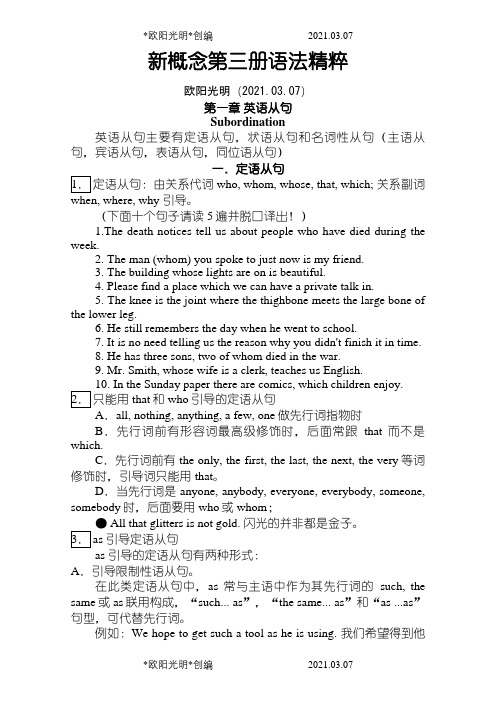
新概念第三册语法精粹欧阳光明(2021.03.07)第一章英语从句Subordination英语从句主要有定语从句,状语从句和名词性从句(主语从句,宾语从句,表语从句,同位语从句)一.定语从句定语从句:由关系代词 who, whom, whose, that, which; 关系副词引导。
(下面十个句子请读 5遍并脱口译出!)1.The death notices tell us about people who have died during the week.2. The man (whom) you spoke to just now is my friend.3. The building whose lights are on is beautiful.4. Please find a place which we can have a private talk in.5. The knee is the joint where the thighbone meets the large bone of the lower leg.6. He still remembers the day when he went to school.7. It is no need telling us the reason why you didn't finish it in time.8. He has three sons, two of whom died in the war.9. Mr. Smith, whose wife is a clerk, teaches us English.10. In the Sunday paper there are comics, which children enjoy.只能用that和who引导的定语从句A.all, nothing, anything, a few, one做先行词指物时B.先行词前有形容词最高级修饰时,后面常跟that而不是which.C.先行词前有 the only, the first, the last, the next, the very等词修饰时,引导词只能用that。
新概念英语第三册语法精粹汇总
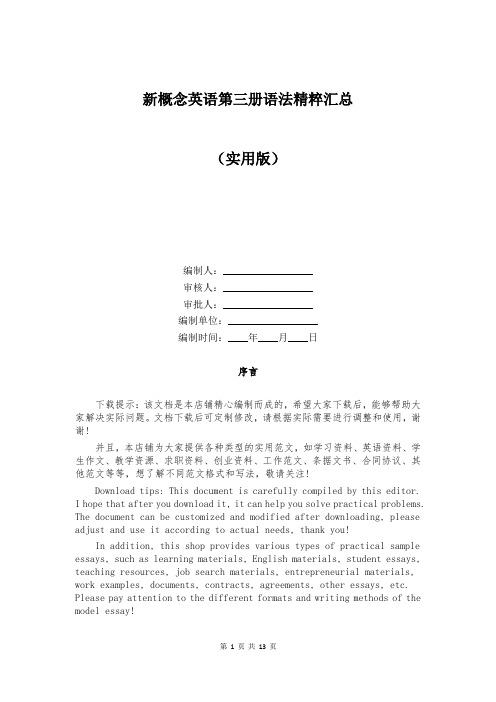
新概念英语第三册语法精粹汇总(实用版)编制人:__________________审核人:__________________审批人:__________________编制单位:__________________编制时间:____年____月____日序言下载提示:该文档是本店铺精心编制而成的,希望大家下载后,能够帮助大家解决实际问题。
文档下载后可定制修改,请根据实际需要进行调整和使用,谢谢!并且,本店铺为大家提供各种类型的实用范文,如学习资料、英语资料、学生作文、教学资源、求职资料、创业资料、工作范文、条据文书、合同协议、其他范文等等,想了解不同范文格式和写法,敬请关注!Download tips: This document is carefully compiled by this editor.I hope that after you download it, it can help you solve practical problems. The document can be customized and modified after downloading, please adjust and use it according to actual needs, thank you!In addition, this shop provides various types of practical sample essays, such as learning materials, English materials, student essays, teaching resources, job search materials, entrepreneurial materials, work examples, documents, contracts, agreements, other essays, etc. Please pay attention to the different formats and writing methods of the model essay!新概念英语第三册语法精粹汇总学习新概念英语并不难啊。
新概念英语第三册全部语法.doc
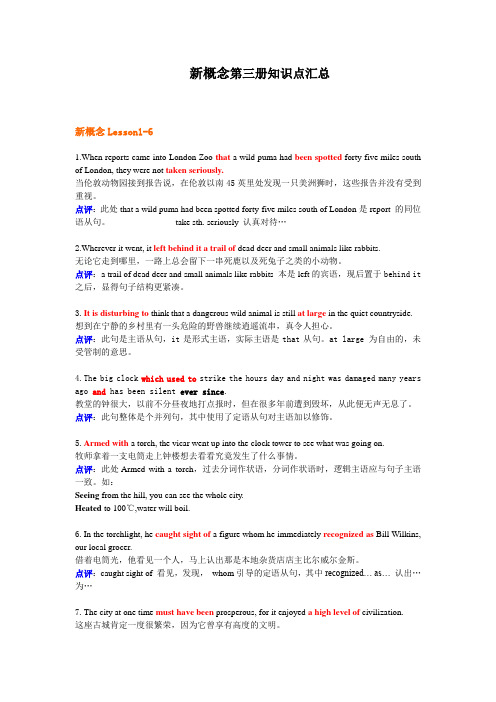
新概念第三册知识点汇总新概念Lesson1-61.When reports came into London Zoo that a wild puma had been spotted forty-five miles south of London, they were not taken seriously.当伦敦动物园接到报告说,在伦敦以南45英里处发现一只美洲狮时,这些报告并没有受到重视。
点评:此处that a wild puma had been spotted forty-five miles south of London是report 的同位语从句。
take sth. seriously 认真对待…2.Wherever it went, it left behind it a trail of dead deer and small animals like rabbits.无论它走到哪里,一路上总会留下一串死鹿以及死兔子之类的小动物。
点评:a trail of dead deer and small animals like rabbits本是left的宾语,现后置于behind it 之后,显得句子结构更紧凑。
3.It is disturbing to think that a dangerous wild animal is still at large in the quiet countryside.想到在宁静的乡村里有一头危险的野兽继续逍遥流串,真令人担心。
点评:此句是主语从句,it是形式主语,实际主语是that从句。
at large 为自由的,未受管制的意思。
4.The big clock which used to strike the hours day and night was damaged many years ago and has been silent ever since.教堂的钟很大,以前不分昼夜地打点报时,但在很多年前遭到毁坏,从此便无声无息了。
新概念英语第三册语法汇总和习题
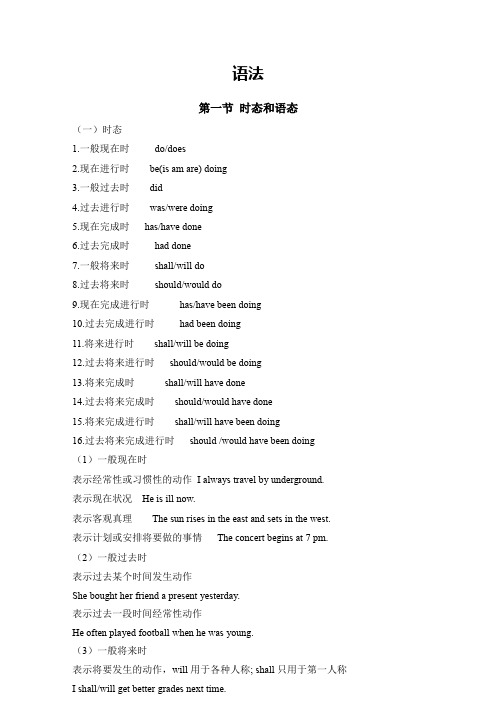
语法第一节时态和语态(一)时态1.一般现在时do/does2.现在进行时be(is am are) doing3.一般过去时did4.过去进行时was/were doing5.现在完成时has/have done6.过去完成时had done7.一般将来时shall/will do8.过去将来时should/would do9.现在完成进行时has/have been doing10.过去完成进行时had been doing11.将来进行时shall/will be doing12.过去将来进行时should/would be doing13.将来完成时shall/will have done14.过去将来完成时should/would have done15.将来完成进行时shall/will have been doing16.过去将来完成进行时should /would have been doing(1)一般现在时表示经常性或习惯性的动作I always travel by underground.表示现在状况He is ill now.表示客观真理The sun rises in the east and sets in the west.表示计划或安排将要做的事情The concert begins at 7 pm.(2)一般过去时表示过去某个时间发生动作She bought her friend a present yesterday.表示过去一段时间经常性动作He often played football when he was young.(3)一般将来时表示将要发生的动作,will用于各种人称; shall只用于第一人称I shall/will get better grades next time.Your parents will be glad to hear that you return home."am / is / are going to+动词原形”用来表示事先考虑过的将要发生的动作Jean is going to meet me at the airport.”be doing”表示根据现在计划或安排做某事I am taking Jane out of dinner tonight.be+(about) to do, 表示近期内要做的事情注意:不能与时间状语连用The new school year is about to start.难点:主将从现时间状语从句:when, whenever, since, till, once, as soon as, while, as ,before, afterI will be an English teacher when I grow up.条件状语从句:if, unless, as long as, so long asIf I have extra money, I will pay the bill for you.(4)现在进行时目前在做的动作He is studying physics very hard these days.现阶段在进行动作I hear you are writing a novel.与always, forever, constantly,continually表达有感情色彩的词汇He is forever asking silly questions like a stupid guy.(5)过去进行时过去某个时刻正在进行动作We were taking photos on the mountains.过去某段时间内的动作I was talking about the new book yesterday morning.(6)将来进行时将来某个时刻正在进行动作When I get home, my mother will be cooking dinner.计划将来要发生的事情She will be studying French at college this time next year.(7)现在完成时已经完成某事,过去的动作对现在有影响We have just e back from the United States.表示过去某一行为持续到现在,可能继续持续下去They have been best mates since school.have been to 曾去过某地,现在已经不在have gone to 已经去了某地,现在可能还在去的路上My father has been to Beijing.My father has gone to Beijing.固定句型:It is the+序数词+time that sb have/has done sth“这是某人第几次去......”It is the first time that his painting has been displayed to the public.(8)过去完成时“过去的过去”:过去某个时间开始一直延续到过去另一个时间的动作I had read half of the book by yesterday.By the time they finished the job, we had reached more.固定句型:It was the+序数词+time that sb had done sth“这是某人第几次去......”It was the second time that I had met the same kind of problem.固定句型:no sooner+过去完成时+than+一般过去时hardly+过去完成时+when+一般过去时scarcely+过去完成时+when+一般过去时“一......就......”They had no sooner reached the office than it began to rain.=They had hardly reached the office when it began to rain.=They had scarcely reached the office when it began to rain.表示过去未曾实现的愿望,与动词intend, mean, plan, hope, wish, want, think, expect 连用I had meant to e ,but something happened.(9)现在完成进行时过去某一时间开始持续到现在,并且继续持续下去I have been waiting for an hour, but he still hasn’t turned up.(10)将来完成时表示将来某时刻之前或某动作前已经发生的动作We shall/wiil have met that manager by next Monday.表示一个持续到将来某时之前或某动作发生之前的动作By next Monday, she will have studied here for three years.(11)过去完成进行时过去某个时间或动作之前一直进行的动作He had been writing this novel up to that time.(12)过去将来时:过去某事看将来要发生的动作John said he would have a rest the next day.(二)语态(1)英语语态:主动语态、被动语态He opened the door. 他打开了这扇门。
新概念英语第三册语法精粹汇总

学习新概念英语并不难啊。
你还在为英语成绩低拖后腿而烦恼吗?今天小编给大家带来新概念英语第三册语法精粹,希望可以帮助到大家,下面小编就和大家分享,来欣赏一下吧。
新概念英语第三册语法精粹:代替与省略英语中,为了避免不必要的重复,经常用so, not, to, do, does代替前面出现的动词或相关内容。
如:He translated the article better than I did. (did代替wrote it)— Do you think she is clever?— I think so. (so代替 she is clever)(1) 从上两例中看出,do / does / did 代替动词。
(2) "so 与 not" 代替某个词、短语、句子等,通常用于hope, think, believe, expect, suppose, be afraid, fear, imagine, etc后作宾语。
E.g. — Is it correct?— I'm afraid not. (not correct)(3) "to" 用作不定式,常跟随下列动词:want, mean, hope, expect, refuse, seem, intend, be, afraid, etc.E.g. I asked him to go to the party, but he refused to. (go to the party)(4) "do so, do that, do it" 用来代替动态动词,而不能代静态动词。
Eg. — He gave up studying English.— Why did he do so? (= give up studying English)— The dish tastes nice.— Yes, so it does. (tastes nice)(此句不能用it does it 或 it does so, 因taste属静态动词。
新概念英语第三册语法详解和总结(带习题)
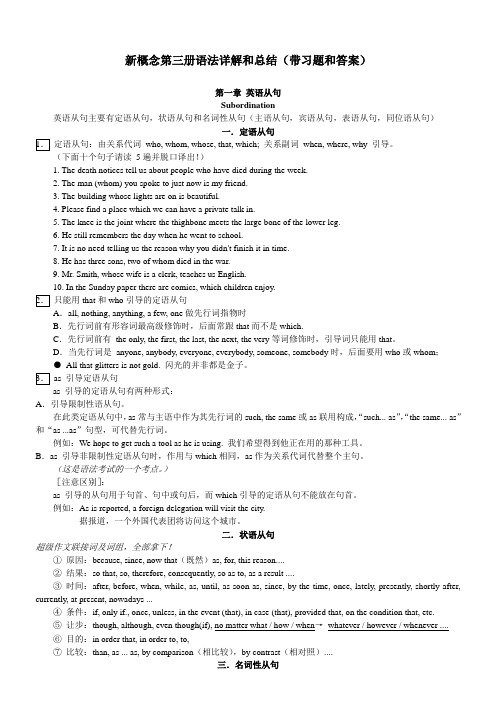
新概念第三册语法详解和总结(带习题和答案)第一章英语从句Subordination英语从句主要有定语从句,状语从句和名词性从句(主语从句,宾语从句,表语从句,同位语从句)一.定语从句定语从句:由关系代词who, whom, whose, that, which; 关系副词when, where, why 引导。
(下面十个句子请读5遍并脱口译出!)1. The death notices tell us about people who have died during the week.2. The man (whom) you spoke to just now is my friend.3. The building whose lights are on is beautiful.4. Please find a place which we can have a private talk in.5. The knee is the joint where the thighbone meets the large bone of the lower leg.6. He still remembers the day when he went to school.7. It is no need telling us the reason why you didn't finish it in time.8. He has three sons, two of whom died in the war.9. Mr. Smith, whose wife is a clerk, teaches us English.10. In the Sunday paper there are comics, which children enjoy.只能用that和who引导的定语从句A.all, nothing, anything, a few, one做先行词指物时B.先行词前有形容词最高级修饰时,后面常跟that而不是which.C.先行词前有the only, the first, the last, the next, the very等词修饰时,引导词只能用that。
新概念英语第三册重点内容汇总【范本模板】

新概念英语第三册Lesson1重点句子及解析敲黑板,划重点:1.Pumas are large, cat—like animals which are found in America.美洲狮是一种体形似猫的大形动物,产自美洲.语言点1 which定语从句修饰animals.语言点2 cat—like是"n。
+adj.”结构的复合形容词,作定语,此类还有:lady—like女性化的,man-like 男人般的,crystal—like水晶般的,baby-like婴儿般的,dog—like像狗一样的,steel—like钢铁般的,home-like像家一样的,angel-like天使般的,dream—like梦境般的。
语言点3 large和cat—like都是描述型定语从句,修饰animals.选择合适的词翻译“大的"或“胖的”。
修饰动物:fat,huge;修饰男人:strong,heavy;修饰女人:large,plump;修饰小孩:robust,chubby。
语言点4 在写作中模仿使用本句结构。
例:Koalas are small,bear—like animals which live in Australia。
2.When reports came into London Zoo that a wild puma had been spotted forty-five miles south of London,they were not taken seriously。
当伦敦动物园接到报告说,在伦敦以南45英里处发现一只美洲狮时,这些报告并没有受到重视。
语言点1 本句是一个由when引导的时间状语从句加that引导的分隔式同位语从句构成的复合句。
语言点2 had been spotted(过去被发现)中spot用词独具匠心,强调在荒野“发现”美洲狮不容易.例句:I finally spottedjust the book I wantedin the bookstore。
新概念3句型总结

新概念3句型总结.doc新概念英语第三册句型总结引言《新概念英语第三册》是一套旨在提高学习者英语阅读、写作、听力和口语能力的教材。
本文档将对第三册中的句型进行详细总结,帮助学习者更好地理解和运用英语句型。
第一部分:句型概述1. 简单句定义:只有一个主语和一个谓语的句子。
例句:She is a student.2. 并列句定义:使用并列连词(如and, but, or等)连接两个或多个简单句。
例句:He tried to phone me, but I was out.3. 复合句定义:包含一个主句和一个或多个从句的句子。
例句:Although he is old, he is still very active.第二部分:主要从句类型1. 名词性从句定义:在句子中充当名词的角色。
例句:What he said is true.2. 定语从句定义:修饰名词或代词的从句。
例句:The man who is talking to John is my uncle.3. 状语从句定义:表示时间、地点、原因、目的、结果等的从句。
例句:If it rains, the match will be postponed.4. 条件状语从句定义:表示条件的从句。
例句:Unless we act now, we will miss the opportunity. 第三部分:特殊句型1. 虚拟语气定义:用来表达假想、愿望或不太可能发生的情况。
例句:If I were you, I would accept the offer.2. 强调句型定义:通过倒装或某些特定结构来强调句子的某一部分。
例句:It was not until I got home that I realized I had forgotten my keys.3. 疑问句定义:询问信息的句子。
例句:Have you finished your homework?4. 否定句定义:含有否定意义的句子。
新概念3语法总结
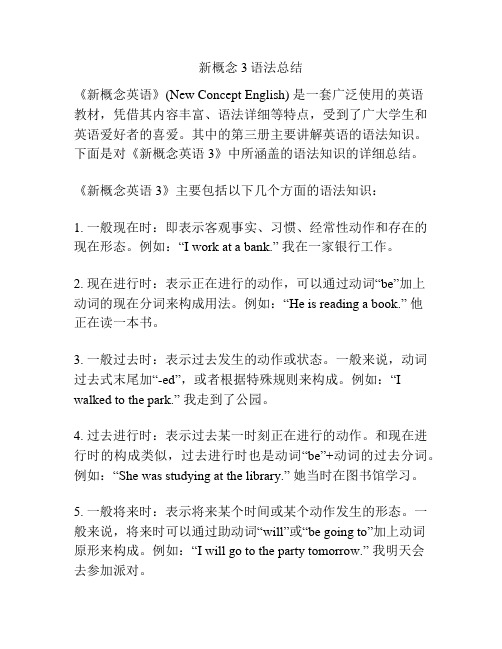
新概念3语法总结《新概念英语》(New Concept English) 是一套广泛使用的英语教材,凭借其内容丰富、语法详细等特点,受到了广大学生和英语爱好者的喜爱。
其中的第三册主要讲解英语的语法知识。
下面是对《新概念英语3》中所涵盖的语法知识的详细总结。
《新概念英语3》主要包括以下几个方面的语法知识:1. 一般现在时:即表示客观事实、习惯、经常性动作和存在的现在形态。
例如:“I work at a bank.” 我在一家银行工作。
2. 现在进行时:表示正在进行的动作,可以通过动词“be”加上动词的现在分词来构成用法。
例如:“He is reading a book.” 他正在读一本书。
3. 一般过去时:表示过去发生的动作或状态。
一般来说,动词过去式末尾加“-ed”,或者根据特殊规则来构成。
例如:“I walked to the park.” 我走到了公园。
4. 过去进行时:表示过去某一时刻正在进行的动作。
和现在进行时的构成类似,过去进行时也是动词“be”+动词的过去分词。
例如:“She was studying at the library.” 她当时在图书馆学习。
5. 一般将来时:表示将来某个时间或某个动作发生的形态。
一般来说,将来时可以通过助动词“will”或“be going to”加上动词原形来构成。
例如:“I will go to the party tomorrow.” 我明天会去参加派对。
6. 现在完成时:表示过去某个时间开始,一直持续到现在的动作。
常常使用助动词“have/has”与动词的过去分词来构成。
例如:“They have lived in London for three years.” 他们已经在伦敦生活了三年。
7. 过去完成时:表示过去某个时间之前发生的动作或状态。
过去完成时由助动词“had”加上动词的过去分词构成。
例如:“She had already finished her homework when I arrived.” 我到达时,她已经完成作业。
全新整理新概念第三册语法
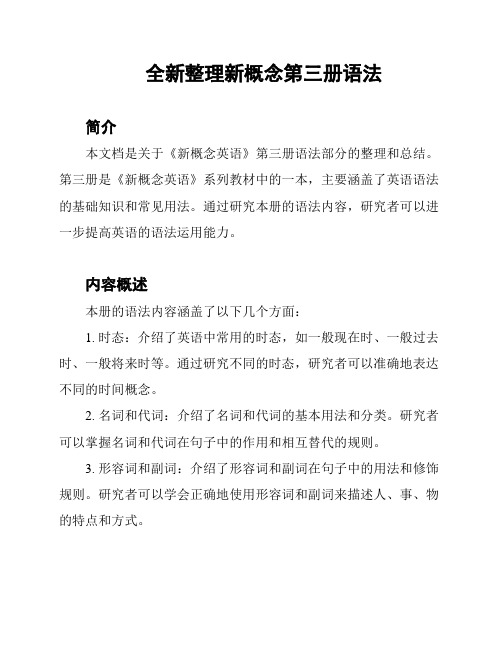
全新整理新概念第三册语法简介本文档是关于《新概念英语》第三册语法部分的整理和总结。
第三册是《新概念英语》系列教材中的一本,主要涵盖了英语语法的基础知识和常见用法。
通过研究本册的语法内容,研究者可以进一步提高英语的语法运用能力。
内容概述本册的语法内容涵盖了以下几个方面:1. 时态:介绍了英语中常用的时态,如一般现在时、一般过去时、一般将来时等。
通过研究不同的时态,研究者可以准确地表达不同的时间概念。
2. 名词和代词:介绍了名词和代词的基本用法和分类。
研究者可以掌握名词和代词在句子中的作用和相互替代的规则。
3. 形容词和副词:介绍了形容词和副词在句子中的用法和修饰规则。
研究者可以学会正确地使用形容词和副词来描述人、事、物的特点和方式。
4. 动词:介绍了动词的不同形态和用法,包括不定式、进行时、完成时等。
研究者可以学会正确地使用动词来表达不同的动作和状态。
5. 句子结构:介绍了简单句、并列句、复合句等不同类型的句子结构和构造方法。
研究者可以学会正确地构造不同类型的句子,提高句子的表达能力。
使用建议为了有效地研究和掌握《新概念英语》第三册的语法内容,建议研究者采取以下研究策略:- 阅读材料:认真阅读教材中的语法部分,理解每个知识点的含义和用法。
- 练题:完成练题,巩固所学的语法知识,并检验自己的理解程度。
- 口语练:运用所学的语法知识进行口语练,提高语法运用的熟练度。
- 扩展阅读:阅读其他相关的英语语法书籍或文章,进一步扩大语法知识的范围和深度。
结论通过学习《新概念英语》第三册的语法内容,学习者可以提高英语语法的理解和运用能力。
建议学习者在学习过程中多进行实践和应用,不断加深对语法知识的理解和掌握。
希望本文档对学习者在学习《新概念英语》第三册的语法部分时有所帮助。
新概念英语第三册语法精粹
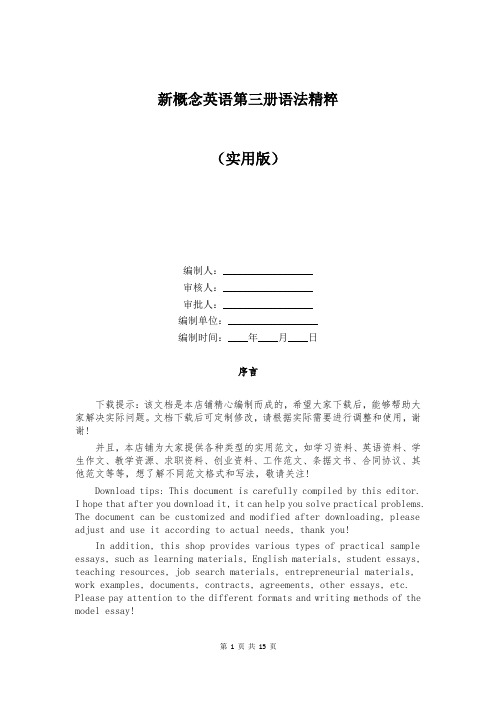
新概念英语第三册语法精粹(实用版)编制人:__________________审核人:__________________审批人:__________________编制单位:__________________编制时间:____年____月____日序言下载提示:该文档是本店铺精心编制而成的,希望大家下载后,能够帮助大家解决实际问题。
文档下载后可定制修改,请根据实际需要进行调整和使用,谢谢!并且,本店铺为大家提供各种类型的实用范文,如学习资料、英语资料、学生作文、教学资源、求职资料、创业资料、工作范文、条据文书、合同协议、其他范文等等,想了解不同范文格式和写法,敬请关注!Download tips: This document is carefully compiled by this editor.I hope that after you download it, it can help you solve practical problems. The document can be customized and modified after downloading, please adjust and use it according to actual needs, thank you!In addition, this shop provides various types of practical sample essays, such as learning materials, English materials, student essays, teaching resources, job search materials, entrepreneurial materials, work examples, documents, contracts, agreements, other essays, etc. Please pay attention to the different formats and writing methods of the model essay!新概念英语第三册语法精粹想要学好英语的你,怎能错过新概念英语第三册语法精粹?今天本店铺给大家带来新概念英语第三册语法精粹,希望可以帮助到大家,下面本店铺就和大家分享,来欣赏一下吧。
新概念三的语法知识点总结
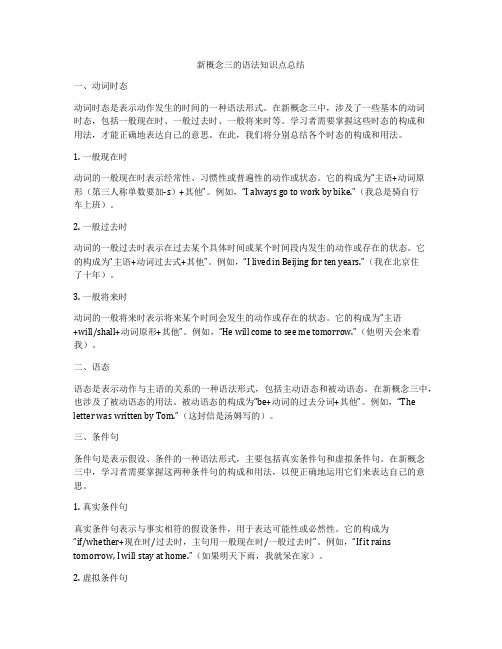
新概念三的语法知识点总结一、动词时态动词时态是表示动作发生的时间的一种语法形式。
在新概念三中,涉及了一些基本的动词时态,包括一般现在时、一般过去时、一般将来时等。
学习者需要掌握这些时态的构成和用法,才能正确地表达自己的意思。
在此,我们将分别总结各个时态的构成和用法。
1. 一般现在时动词的一般现在时表示经常性、习惯性或普遍性的动作或状态。
它的构成为“主语+动词原形(第三人称单数要加-s)+其他”。
例如,“I always go to work by bike.”(我总是骑自行车上班)。
2. 一般过去时动词的一般过去时表示在过去某个具体时间或某个时间段内发生的动作或存在的状态。
它的构成为“主语+动词过去式+其他”。
例如,“I lived in Beijing for ten years.”(我在北京住了十年)。
3. 一般将来时动词的一般将来时表示将来某个时间会发生的动作或存在的状态。
它的构成为“主语+will/shall+动词原形+其他”。
例如,“He will come to see me tomorrow.”(他明天会来看我)。
二、语态语态是表示动作与主语的关系的一种语法形式,包括主动语态和被动语态。
在新概念三中,也涉及了被动语态的用法。
被动语态的构成为“be+动词的过去分词+其他”。
例如,“The letter was written by Tom.”(这封信是汤姆写的)。
三、条件句条件句是表示假设、条件的一种语法形式,主要包括真实条件句和虚拟条件句。
在新概念三中,学习者需要掌握这两种条件句的构成和用法,以便正确地运用它们来表达自己的意思。
1. 真实条件句真实条件句表示与事实相符的假设条件,用于表达可能性或必然性。
它的构成为“if/whether+现在时/过去时,主句用一般现在时/一般过去时”。
例如,“If it rains tomorrow, I will stay at home.”(如果明天下雨,我就呆在家)。
新概念英语第三册语法

新概念英语第三册语法新概念英语第三册语法精讲及练习<二>:虚拟语气摘要:新概念英语第三册语法精讲及练习.虚拟语气用来表达不可能或难以实现的愿望,与事实相反的假设,通常分为基本的三种形式.新概念英语第三册语法精讲及练习虚拟语气用来表达不可能或难以实现的愿望,与事实相反的假设,通常分为基本的三种形式.1. 与现在事实相反的虚拟:If + did / were + ..., ... wouldshouldcould + do <动词原形>mightIf I were you, I would go abroad at once. <I am not you.> If he knew it now, he could help me. <He doesn't know it now.>2. 与过去事实相反的虚拟:If + had done + ..., ... would <might> have done ...If I had known your telephone number yesterday, I would have phoned you.<I didn't know your telephone number.>If you had come here a littleearlier just now, you might have met her.<You didn't come here earlier.>3. 与将来事实相反的虚拟:<1> If + should + v., ... would + v.<可能性很小><译作"万一">If it should rain tomorrow, you could stay at home.If I should fail, what should Ido?<2> If + did / were to + v ..., would + v.<完全不可能>If the sun were to rise in the west, I would lend you themoney.If you finished it in 3 minutes, I would give you my car.4. 金牌特殊重点:!![简单联想记忆]:● 下列动词后的"宾语从句"中需要用虚拟形式,即should + 动词原形,shoud在美国英语中要省略<TOEFL语法考点>.此类常见的动词有:order, ask, decide, demand, require, recommend, suggest<建议>insist<坚决要求>,advise, etc.例句:He suggested that we <should> help them with English.The teacher ordered that the homework <should> be finished within half an hour.● 下列名词后的同位语从句中要用"should + 动词原形"<should可省去>的虚拟.suggestion, order, request, demand, importance, proposal.He made a suggestion that we <should> have a fancy dress party.I think it is a thing of importance that it <should> be done soon.● It is / was important / necessary / natural / essential / advisable / strange / surprising, ect. + that +主语+ should + v.It is strange that you should say such a thing.It was important that you should tell me all the information.● wish后的宾语从句中,as if 后的状语从句中,须用下列的虚拟形式:主 + wish+ <that> + 主 + did / were<指现在>haddone<指过去>would+ v.<指将来>Iwishthat I met my uncle now.IwishI had met my uncle yesterday.IwishI could meet my uncle tomorrow.测试精编:选择正确选项:1. I ________ he had taught me the word, but he didn't.A. believeB. hopeC. wishD. think2. The man in charge recommends that this matter ________ at the meeting.A. would be discussedB. will be discussedC. be discussedD. may be discussed3. It is raining now, otherwise we ________ go out play.A. couldB. canC. mayD. will4. ________ he come late, give him the message.A. HadB. ShouldC. WouldD. Did5. Hadn't my car broke down, I ________ the train.A. would have caughtB. might catchC. could catchD. would catch6. I would have helped him if I had time, but I ________.A. haven'tB. hadC. didn'tD. wouldn't7. The dam was built in time to protect the inhabitants from the flood; ________.A. otherwise the damage would be beyond measure.B. the damage, otherwise, should be very great.C. the damage could have been very serious otherwise.D. the damage caused, therefore, many of them homeless.8. It is natural that an employee ________ his work on time.A. finishesB. finishC. can finishD. finishs9. I would go abroad but that I ________ poor.A. amB. wasC. shall beD. were10. Don't act as if you ________ the only pebble on the beach.A. areB. wereC. have beenD. would be1. C2. C3.A4. B5.A6. C7. C8. B9.A 10. B新概念英语第三册语法精讲及练习<三>:代替与省略摘要:新概念英语第三册语法精讲及练习.英语中,为了避免不必要的重复,经常用so, not, to, do, does 代替前面出现的动词或相关内容新概念英语第三册语法精讲及练习英语中,为了避免不必要的重复,经常用so, not, to, do, does 代替前面出现的动词或相关内容.如:He translated the article better than I did. <did代替wrote it>— Doyou think she isclever?— I think so. <so代替 she is clever><1> 从上两例中看出,do / does / did 代替动词.<2> "so 与 not" 代替某个词、短语、句子等,通常用于hope, think, believe, expect, suppose, be afraid, fear, imagine, etc 后作宾语.E.g. — Is it correct?— I'm afraid not. <not correct><3> "to" 用作不定式,常跟随下列动词:want, mean, hope, expect, refuse, seem, intend, be, afraid, etc.E.g. I asked him to go to the party, but he refused to. <go to the party><4> "do so, do that, do it" 用来代替动态动词,而不能代静态动词.Eg. — He gave up studying English.— Why did he do so? <= give up studying English>— The dish tastes nice.— Yes, so it does. <tastes nice><此句不能用it does it 或 it does so, 因taste属静态动词.><5> 为使语言精炼,避免不必要的重复,对话中常用省略形式.E.g. — He is thinking of buying a car?— Is he?<这里,"thinking of buying a car"被省略了.>— Will he come back in time?— Perhaps.<省略了he will come back in time.>测试精编:1. — Shall I wake you up tomorrow? — Yes, ________ .A. please doB. you shallC. you willD. you may2. I think records are often ________ an actual performance.A. as good as or better thanB. as good or better thanC. like good or better thanD. as good as any other3. —If he doesn't come to work, he may be fired. —Surely he isn't so foolish ________ not to realize that.A. soB. andC. butD. as4. — Don't you think Alan's health has beenruined by smoking? — Yes, he told me ________ himself.A. the factB. this thingC. ItD. so5. — Will you go home tomorrowevening? — No, I'm going to a lecture, or at least, I'm planning ________ .A. onB. toC. soD. It6. — I slipped on the stairs, I think my arm is broken. — Oh! I ________ .A. do not hope soB. do not hopeC. hope not soD. hope not7. California relies mainly on income from fruit crops, and ________ .A. Florida alsoB. Florida tooC. Florida is as wellD. so does Florida8. — Have you been here long? — ________ .A. No, not veryB. Not muchC. Yes, only littleD. No, only yesterday9. — You look happy today, Mary. — I like my new dress and mother ________, too.A. doesB. likesC. isD. do10. — So you are lost, little boy. Why didn't you hang on to your mother's skirt?— ________, but I couldn't reach it.A. I hanged toB. I did toC. I didn't hang toD. I tried toKey:1.A2.A3. D4.D5. B6. D7. D8.A9.A 10.D摘要:新概念英语第三册语法精讲及练习.根据语法要求,把谓语动词置于主语前,称为完全倒装,把助动词或情态动词置于主语前,称为部分倒装.新概念英语第三册语法精讲及练习倒装根据语法要求,把谓语动词置于主语前,称为完全倒装,把助动词或情态动词置于主语前,称为部分倒装.1.副词如:in, out, down, there, here, off, over, away, etc. 句子倒装.<完全倒装,但主语不能是代词>Down jumped the murderer from the tenth floor.In came Miss Green.<特别注意:当主语是人称代词时不倒装.>Away she went!<她走了!>Here you are!<你在这儿!>2.only + 副词<介词短语>位于句首,句子要倒装.Only then did he realize that he was mistaken.Only by working hard can we succeed in doing anything.3.well, so, often, such, few, little 放于句首,句子形成倒装.So fine was the weather that we all went out lying in thesun.Well did I know him and well did he know me.4.否定词或具有否定意义的词及词组用在句首时,句子须倒装.此类词有: neither,nor,hardly,scarcely,rarely,seldom,not,never,not only,barely,at no time,nowhere 等.e.g. — Jack could not swim.— Neither could Tom.Never have I seen such a good movie.5.as引导让步状语从句,须倒装.<准确地说,是将需要强调的词提到as的前面.>Rich as he is, he spends a cent on charity.Try as he does, he never seems able to do the work beautifully.6.在表示祝愿的句子中.May you make greater progress! <愿你取得更大进步!>7.在虚拟条件句中,连词if省略时,句型要倒装,即将were, had, should等词提到句首.Were I you, I would go abroad to take advanced study.我要是你,就出国进修了.Should he come tomorrow, he would help us to settle the problem.他要是明天来的话,他会帮我们解决这个问题的.8.百分特例重点:Much as we may pride ourselves on our good taste, we are no longer free to choose the things we want.<NCE Book III Lesson 26>尽管我们为自己的绝好鉴赏力感到自豪,但我们已经无法自由地选择我们所需要的东西了1. Not until the mid-nineteenth-century discovery of vast deposits of borate's in the Majave Desert ________ relativelyA. borax becameB. did borax becomeC. and borax becomeD. borax's becoming2. ________ received law degrees as today.A. Never so many women haveB. Never have so many womenC. The women aren't everD. Women who have never3. ________ the Bob's belongings that he carried them ina bundle slung over his shoulders.A. Were so fewB. Few were soC. So few wereD. They were so few4. Only after a baby seal is pushed into the sea by its mother ________ to swim.A. how will it learnB. will it learn howC. it will learn howD. and it learns how5. Not only ________ a promise, but he also kept it.A. did he madeB. he madeC. did he makeD. he makes6. Nowhere in the world ________ .A. travelers can buy so much beauty for so little as in Hawaii.B. no one can buy so much beauty for so little money as Hawaii.C. so much beauty can be bought for so little money in Hawaii.D. can travelers buy so much beauty for so little money as in Hawaii.7. No sooner ________ gone home than it began to rainA. had IB. have IC. I hadD. I have8. Not for a moment ________ the truth of your story.A. he has doubtedB. he doubtsC. did he doubtD. he did doubt9. ________ succeed in doing anything.A. Only by working hard we canB. By only working hard we canC. Only by working hard can weD. Only we can work hard10. Never before in similar circumstances ________ .A. a British Prime Minister had refused to step down.B. did a British Prime Minister have refused to step down.C. a British Prime Minister did have refused to step down.D. had a British Prime Minister refused to step down.1. B2. B3. C4. B5. C6. D7.A8.C9. C 10. D新概念英语第三册语法精讲及练习形容词定义:形容词是用来修饰名词的词,描述名词的性质、外观、特点等.功能:形容词可以做定语、表语或补助语.分类:主要分为两类:描绘性形容词和限定性形容词.● 描绘性形容词主要用来描绘大、小、新旧、颜色、质量等.● 限定性形容词主要用来限定所修饰词的数量、距离及X围所属等.1.当形容词修饰单数可数名词时,必须与冠词连用:a lovely girl, the naughty boy2.形容词可与系动词连用,做表语,说明主语的性状.常用系动词有:be,become,seem,appear,feel,look,taste,smell,sound, remain,go,turn,keep,stay, etc.The dish tastes delicious.The music sounds sweet.The milk went bad.小心陷阱 feel,smell,taste,look,keep有时可以用作实义动词,并可以用副词修饰.He looked me up and down carefully.I tasted the soup slowly to see whether it was salty.3.形容词用作后置定语.<简单理解:一般的形容词修饰名词时放在名词前面,但有些形容词修饰名词时放在名词的后面>a river navigable<一条可通航的河>sight visible可见的景象person responsible<负责人>注意:responsible person<有责任心的人>the best way possible<尽可能好的办法>the number necessary<必要的数量>the people present<在场的人>4.只能作表语的形容词1.某些表示健康状况的形容词.well<身体好的>,ill<病的>,faint<虚弱的>,poorly<身体不好的>示例:His mother has been ill for a long time.特别注意:sick是个特例.它既可做表语,又可做定语.He is sick for a couple of days.<他病两三天了>He is a sick person.<他是个病人.>2.某些以 a-开头的形容词.如:afraid<害怕的>,alone<独自的>,alive<活着的>,asleep<睡着的>,awake<醒着的>,aware<意识到的>The old man is alone in the house.<老人一个人在家.>The teacher is alive with enthusiasm.<这位老师热情洋溢.> He is asleep in his mother's arms.<他在母亲的怀抱中睡着了.>I have been aware of the difficulty.<我已经意识到了困难.>. The Chinese food served in American restaurant is not bad but I prefer ________.A. Chinese food authenticallyB. Chinese authentic foodC. food Chinese authenticallyD. authentic Chinese food2. ________ lessons were not difficult.A. Our first few short EnglishB. Our few first short EnglishC. Our few first English shortD. Few our first English short3. — Do you think that the Labor bill will be passed? —Oh, yes, it's ________ that it will.A. almost surelyB. very likelyC. near positiveD. quite certainly4. — Have you traveled much? — No, I have done ________ traveling.A. fewB. littleC. smallD. less5. —I was very busy. —Did you really work hard ________?A. all dayB. all the dayC. all the day longD. all of day long6. —Do you need anything from the store? — ________ and some cheddar cheese.A. Only a French bread loafB. A French bread loaf onlyC. Only a loaf of French breadD. A loaf of French bread only7. According to the information, the newly-constructed highway is said to be ________.A. lengthy twenty milesB. length about twenty milesC. about twenty miles longD. in twenty miles of length8. Mr. Smith has done ________ business here.A. a lot ofB. a number ofC. muchD. lots9. —Are you helping to organize the political convention? — I'm in charge of welcoming the ________.A. out-of-town visitorsB. visitors from outside of townC. visitors out-of-townD. outside town visitors10. — Does Jane have brown hair? — Yes, In fact, it's quitesimilar in shape ________ yours.A. asB. withC. likeD. to1.D2.A3. B4. B5.A6. C7.C8.A9.A 10.D新概念英语第三册语法:反意疑问句摘要:新概念英语第三册语法:反意疑问句1.一般用法:He is a student, isn't he?He isn't a student, is he?<1> "have to, had better, used to"要用下列方式反问:He has to finish the work, doesn't he?They used to smoke, didn't / usedn't they?You'd better get up immediately, hadn't you?<2> "has, have"作为助动词和实意动词,反问形式不同.We have done all the work, haven't we?You have some time, don't you?2. "seldom, barely, hardly, scarcely, few, little" 语意本身是否定,因此反意问句应为肯定形式.She seldom comes to visit us, does she?He hardly knew it, did he?3.当主句为祈使句,反意问句提出要求,命令应用 "will you"Do it at once, will you?但如表示邀请,劝告,反意问句用 "won't you"Have a cup of tea, won't you?4.否定祈使句应用 "will you" 来反问.Don't open the window, will you?5. "Let's" 短语● 当其为肯定形式,"shall we" 提出反问Let's play basketball, shall we?● 当其为否定形式,"all right, ok" 提出反问Let's not go to the party, all right?● 如为 "let us ..." 其反问形式应为 "will you" 提出请求Let us go home, will you?6.当 "think, suppose, consider, believe" etc 被用作为主句谓语动词,其后带有宾语从句时,反意疑问问句应与从句保持一致.I don't think that he is an honest man, is he?许多句子在描述一个人或一件物品时往往会出现一系列修饰语;动词的修饰语, 即副词往往也会几个同时使用,构成平行结构,平行结构要求语法结构须保持一致,如:1.系列动词:After school, we sang, danced and played the piano in the classroom.2.系列形容词:She is slim, tall, blond and beautiful.3.系列副词:The students are listening to me carefully and eagerly.平行结构不仅包括动词,形容词,副词,也包括分词,不定式,动名词,名词短语和句子等的平行用法,务必提高辨别力.易混淆的动词1. rise,raise,arise,arouse"rise" 是不及物动词,过去式为rose,过去分词为risen,其基本词义"上升,上涨".The sun rises in the east.A good idea rose in my mind. "raise" 是及物规那么动词,"举起,提高".He raised his voice to make himself heard.The boy can raise the heavy stone."arise",是不及物动词,过去式为arose,过去分词arisen,其语义为"出现,发生" .His curiosity arose due to the question his mother asked."arouse"是及物动词,过去式和过去分词为aroused,其语义为"唤醒,引起"arouse somebody from sleep 把某人唤醒arouse suspicion 引起怀疑2. lay,lie,lie"lay"及物动词,"放置,生蛋",过去式与过去分词为 "laid"I've laid the book on the self.The hen lays an egg every day."lie"不及物动词"位于,平躺",过去式为"lay"过去分词 "lain"He lay on the floor and slept soundly.Beijing lies in the north of China."lie"及物动词"说谎",它是规那么动词.He lied to his teacher.3. sit,seat"sit"不及物动词,过去式与过去分词均为 "sat".He sat in the classroom reading newspaper."seat"及物动词,"使就坐""容纳".He seats himself here.He is seated there.He seats the baby on his knees.The hall will seat 5000 people.4. affect,effect"affect" 及物动词,"对……有影响,感动,触及"The relations between then will be affected."effect" 及物动词, "导致,造成,带来〔变化〕,产生"The changes in methods effected some improvement in his study.5. hang <hanged, hanged> / <hung, hung>当 hang过去式与过去分词为 "hanged",其含义是"绞死";而当hang的过去式与过去分词为"hung"时,其含义是"悬挂".The man was hanged for murder.He hung his coat on the hook.6. borrow,lend"borrow"借入 "borrow sth. from ...""lend"<lent, lent> 借出 "lend sb. sth" 或 "lend sth. to sb."7. take,bring,fetch"take"<took, taken> 及物动词"拿走""bring"<brought, brought> 及物动词"带走""fetch" 及物动词"去取回来"1. receive,accept"receive" 客观上收到"accept" 主观上愿意接受I received his gift, but I wouldn't like to accept it.2. fit, suit"适合""fit" 指"尺寸"的适合"suit" 指"款式,花样等"的适合The dress doesn't fit me. It is too long.Blue is the color that suits her well.3. answer, reply "回答""answer" — vt."reply" — vi 须和 "to"连用"You needn't know it." He answered.So far, they haven't answered / replied to our questions.4. spend, cost, take "花费""spend" <spent, spent> 花"时间,金钱"主语须是人.He spend 5 hours writing the article."cost" <cost, cost> 花费"金钱,时间,劳力"可接双宾,主语须是"物".The book cost me $20 and 2 days."take" 通常指花"时间"主语须是"某种事情".It takes me 20 minuter to go to school.The work took me longer than I expected.5. assure,ensure"assure" 使放心 assure sb. of sth.assure sb. that...I can assure you of my honesty."ensure" 保证 ensure sth.〔其后不能接人称〕ensure thatensure doing sth.I can ensure his safety.He ensured that he finished the job in time.He ensured coming back later.百分重点:如ensure 含义为"保护,使安全",其结构为:ensure sb from / against sth.He ensured the boy from drowning.6. beat, defeat, win — vt."beat" <beat, beaten> 战胜,打败比赛,辩论中的对手He beat John at chess yesterday."defeat""击败"敌军,入侵者,整个球队They defeated the enemy in that battle."win" <won, won>"赢得比赛"win over sb.〔赢了某人〕The football team won the match.7. damage,destroy,hurt,spoil,wound,injure以上六个词中,"hurt" 可作及物,不及物动词外,其余五个均为及物动词."damage" ——损坏〔害〕〔有修复的可能性〕"destroy" ——摧毁,打破〔希望,计划〕毁灭〔无修复的可能性〕"hurt" ——伤害〔感情或身体某一部位〕痛疼"spoil" ——破坏,糟蹋〔晚会,旅游,参观等〕宠爱,惯怀〔孩子〕"wound" ——使受伤〔枪伤,刀伤〕"injure" ——使受伤Don't spoil your son too much.The man has destroyed the girl's life all her hopes.Some houses were damaged in the earthquake.I don't mean to hurt you.He was injured in the accident.It was dangerous because he was wounded seriously in the war测试精编1. His newly-published novel is quite a success ________a good income from the reading public.A. ensuring himB. assuring himC. assuring him ofD. assuring him about2. My watch ________ five o'clock.A. saysB. tellsC. speaksD. talks3. "He has been working very hard recently." "Because the burden of a big family has been ________ on his shoulder."A. bearB. borneC. bornD. bore4. The visiting delegates were urged to ________.A. talk at libertyB. state their open mindsC. make individual expressionsD. speak freelyKEYS1.C2.A3. B4.D代替与省略英语中,为了避免不必要的重复,经常用so, not, to, do, does 代替前面出现的动词或相关内容.<1> 从上两例中看出,do / does / did 代替动词.He translated the article better than I did. 〔did代替wrote it〕— Do you think she is clever?— I think so. 〔so代替 she is clever〕<2> "so与not" 代替某个词、短语、句子等,通常用于hope, think, believe, expect, suppose, be afraid, fear, imagine, etc 后作宾语.— Is it correct?— I'm afraid not. <not correct><3> "to" 用作不定式,常跟随下列动词:want, mean, hope, expect, refuse, seem, intend, be, afraid, etc.I asked him to go to the party, but he refused to. <go to the party><4> "do so, do that, do it" 用来代替动态动词,而不能代静态动词.— He gave up studying English.— Why did he do so? <= give up studying English>— The dish tastes nice.— Yes, so it does. <tastes nice>〔此句不能用it does it 或 it does so, 因taste属静态动词.〕<5> 为使语言精炼,避免不必要的重复,对话中常用省略形式.— He is thinking of buying a car?— Is he? 〔这里,"thinking of buying a car"被省略了.〕— Will he come back in time?— Perhaps. 〔省略了he will come back in time现在完成时:1.构成:have / has + 过去分词2.功能:〔1〕表示过去所发生的动作对现在的影响或产生的结果.常与yet, just, before, recently, lately〔最近〕, ever, never等表时间的副词搭配使用.He hasn't seen her lately.I haven't finished the book yet.〔2〕表示一个从过去某个时间开始,延续到现在并可能持续下去的动作,常与表示一段时间的时间状语连用.如:so far〔迄今为止〕, up till now〔直到现在〕, since, for a long time〔很长时间〕, up to present〔直到现在〕, in the past / in the last few years 〔在过去的几年里〕, these days〔目前〕……He has worked here for 15 years.I have studied English since I came here.The foreigner has been away from China for a long time.So far, I haven't received a single letter from my brother.〔3〕某些非延续性动词〔即:动作开始便终止的动词〕,在现在完成时中不能与表示一段时间状语搭配.黄金要点:I.常见的非延续动词:die, arrive〔到达〕, join〔加入〕, leave 〔离开〕, go, refuse〔拒绝〕, fail〔失败〕, finish, buy, marry, divorce〔离婚〕, awake〔醒〕, buy, borrow, lend ... 〔背三遍!〕II.这类动词并非不能用现在完成时,而是不能接常由for引导的时间状语.III.但若是用在否定句中,非延续动词的现在完成时可以与表示一段时间的状语连用.She has gone away for a month.〔误〕She has been away for a month 〔正〕The man has died for two years.〔误〕The man has been dead for two years.〔正〕How long have youbought the book?〔误〕How long have you got the book.〔正〕〔4〕注意 since的用法:They haven't had any trouble since they came here.It has been ten years since we met last time.He has been here since 1980.He has been here since ten years ago.几组对比:He has gone to Shanghai. 他到##去了.He has been to Shanghai. 他去过##.She has gone. 她已走了.She is gone. 她缺席了.〔或者她死了.〕The door has been closed. 门关上了.〔动作〕The door is closed. 门是关着的.〔状态〕测试精编1. The prices ________ going up all the time in the past few years.A. keepB. keptC. have keptD. are keeping2. For the whole period of two months, there ________ no rain in this area.A. isB. will beC. has beenD. have been3. Today is Jane's wedding day. She ________ John.A. have just married withB. was just married toC. has just been married toD. just has been married to4. No wonder the flower have withered, they ________ any water for ages.A. hadn'tB. haven'tC. haven't hadD. hadn't had5. Nowadays computer ________ a wide application with the development of production and science.A. foundB. has foundC. findsD. had foundKEYS1. C2. C3. C4. C5. B虚拟语气用来表达不可能或难以实现的愿望,与事实相反的假设,通常分为基本的三种形式.1. 与现在事实相反的虚拟:If + did / were + ..., ... would/ should/ could/ might + do 〔动词原形〕If I were you, I would go abroad at once. <I am not you.> If he knew it now, he could help me. <He doesn't know it now.>2. 与过去事实相反的虚拟:If + had done + ..., ... would <might> have done ...If I had known your telephone number yesterday, I would have phoned you. <I didn't know your telephone number.> If you had come here a little earlier just now, you might have met her. <You didn't come here earlier.>3. 与将来事实相反的虚拟:<1> If + should + v., ... would + v. 〔可能性很小〕〔译作"万一"〕If it should rain tomorrow, you could stay at home.If I should fail, what should Ido?<2> If + did / were to + v ..., would + v. 〔完全不可能〕If the sun were to rise in the west, I would lend you the money.If you finished it in 3 minutes, I would give you my car.[简单联想记忆]:下列动词后的"宾语从句"中需要用虚拟形式,即should + 动词原形,shoud在美国英语中要省略〔TOEFL语法考点〕.此类常见的动词有:order, ask, decide, demand, require, recommend, suggest 〔建议〕, insist〔坚决要求〕, advise, etc.He suggested that we <should> help them with English.The teacher ordered that the homework <should> be finished within half an hour.下列名词后的同位语从句中要用"should + 动词原形"〔should 可省去〕的虚拟.此类常见的名词有:suggestion, order, request, demand, importance, proposal.He made a suggestion that we <should> have a fancy dress party.I think it is a thing of importance that it <should> be done soon.It is / was important / necessary / natural / essential / advisable / strange / surprising, ect. + that +主语+ should + v.It is strange that you should say such a thing.It was important that you should tell me all the information.wish后的宾语从句中,as if 后的状语从句中,须用下列的虚拟形式:主 + wish+ <that> + 主 + did / were〔指现在〕had done〔指过去〕would+ v.〔指将来〕I wish that I met my uncle now.I wish I had met my uncle yesterday.I wish I could meet my uncle tomorrow.It is <high> time that ... + did / were ...It is time that you went to bed.would rather that ... + did / were ...I would rather that you were not here now.would sooner that ... + did / were ...I would sooner that you got up earlier.I would sooner that you were not my brother独立主格结构此独立形式只是一个小短语,而不是主谓完整的简单句,又称之为独立分词构句.当分词意义上的主语不是主句的主语时,必须在分词前保留意义上的主语,否那么语意不通.示例:Being ill in bed, I can't go to school.Mother being ill in bed, I can't go to school.1.独立主结构形式可用以表时间,理由,条件,伴随状态等.He lay on the grass, the sun shining upon him.= He lay on the grass, and the sun was shining upon him.Weather permitting, I'll start tomorrow.= If weather permits, I'll start tomorrow.School being over, the boys went home.= When school was over, the boys went home.The sun having set, we arrived at the station.= After the sun had set, we arrived at the station.王牌重点:当独立主格结构的主语表示"一般人",如:we, one, you时,主语可省略,此用法常用于下列表达方式中:generally speaking 一般来说strictly speaking 严格地说talking of ... 谈到speaking of ... 说到judging from ... 由……来判断taking all things into consideration 把一切都考虑在内considering ... 考虑到……[示例]If we judge from his face, he must be ill.= Judging from his face, he must be ill.He has lots of books if we consider that he is young.= He has lots of books, considering that he is young.2.with 复合结构也是独立主格结构形式之一.这种结构在句中作状语〔表示原因,方式,伴随等〕和定语,作定语时紧随被修饰名词后.<1> with+ 名词 + 介词短语The woman with a baby on her back is my sister.The boy rushed into the room, with his schoolbag in his hand.<2> with + 名词 + adj.with the door open, he left the classroom.<3> with + 名词 + adv.With the gloves off, she felt cold.With the lights on, the building looks beautiful.<4> with + 名词 + 现在分词〔主动〕with + 名词 + 过去分词〔被动〕With the guide leading us, we got to the village.The boy was crying with the vase broken.<5> with + 名词 + 不定式With the hard work to be done, we have to prepare for it.。
新概念英语第三册语法解析汇总
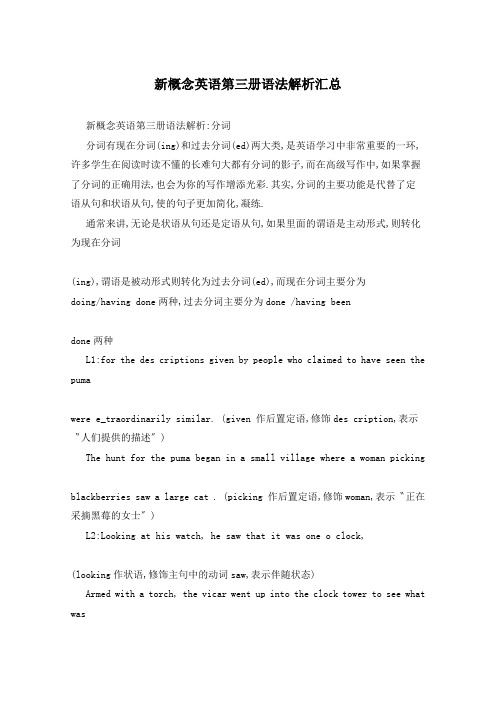
新概念英语第三册语法解析汇总新概念英语第三册语法解析:分词分词有现在分词(ing)和过去分词(ed)两大类,是英语学习中非常重要的一环,许多学生在阅读时读不懂的长难句大都有分词的影子,而在高级写作中,如果掌握了分词的正确用法,也会为你的写作增添光彩.其实,分词的主要功能是代替了定语从句和状语从句,使的句子更加简化,凝练.通常来讲,无论是状语从句还是定语从句,如果里面的谓语是主动形式,则转化为现在分词(ing),谓语是被动形式则转化为过去分词(ed),而现在分词主要分为doing/having done两种,过去分词主要分为done /having beendone两种L1:for the des criptions given by people who claimed to have seen the pumawere e_traordinarily similar. (given 作后置定语,修饰des cription,表示〝人们提供的描述〞)The hunt for the puma began in a small village where a woman pickingblackberries saw a large cat . (picking 作后置定语,修饰woman,表示〝正在采摘黑莓的女士〞)L2:Looking at his watch, he saw that it was one o clock,(looking作状语,修饰主句中的动词saw,表示伴随状态)Armed with a torch, the vicar went up into the clock tower to see what wasgoing on. (Armed作状语,由于be armed with形式所以采用过去分词,在句中作状语,修饰went up,表示伴随)L8: St. Bernard dogs have saved the lives of travellers crossing thedangerous Pass. (crossing 在这里作后置定语,修饰travellers,表示〝穿越关隘的游客〞)L_:even if he has five hundred gold watches hidden in hissuitcase.(hidden作后置定语,修饰)L_:Not wanting to frighten the poor man, Mrs. Richards quickly hid in thesmall storeroom under the stairs. (wanting的否定形式在这里作目的状语)L_:Then, squinting his eyes, he said: The light is dim. Read the letter tome .(squinting作伴随状语)L24: Dropping my suit, I dashed downstairs to tellGeorge.(dropping作伴随状语,说明和dash这个动作同时发生,突出当时的恐惧之情)关于分词的用法,新概念三册随处可见这样的例子,上面列举的句子也只是新三的皮毛而已,如果同学们对分词的用法感兴趣,或者想要把它牢牢掌握,可以找出新三中其他带有分词的句子逐一分析,相信一定会大有收获.新概念英语第三册语法解析:双重否定英文中的双重否定功能很多,很多同学认为双重否定有些啰嗦,表达的和肯定句是一样的,其实不然,双重否定句还有另外两个功能,即强调否定和委婉否定.第9课中描述猫的吸引力,原句:Cats never fail to fascinate human beings.其实这里的双重否定never failto 相当于英文中的always,不过更加突出强调了〝总是〞.比如我们表达对某道菜的喜爱,就可以利用这种方式:Sweet and Sour Pork neverfail to fascinate human beings.第26课中描述广告的吸引力,原句:No one can avoid being influenced by advertisements.作者在这里想强调的是人人都会受到广告的影响.在我们平时写作时,当描述一片美丽景色时,也利用这个句型,比如:No one can avoid beingtempted by the beauty of Shangri-la. 没有人能避免受到香格里拉美景的诱惑.第43课中描述〝常有的事〞,原句:It is not uncommon to hear that a shipping company has madea claim for cost of salvaging a sunken ship. 这里的notuncommon便是指的〝常有的事〞,类似的表达还有not illegal. not unavailable,not unusual等等.新概念英语第三册语法解析:冠词不定冠词〝a〞用来表示可数名词的单数形式,用于辅音音素前,an用于元音音素前.如:a person, a day; an hour, anold man...I.定冠词用法如下:(英语刚启蒙时你就知道冠词了,可你真正掌握了吗?再背一遍又何妨?!)1.用于双方都知道的名词前:Please cleanthe classroom.2.用于单数名词前,表示一类人或物:The horseis a useful animal.(马是有用的动物)This is a very hardjob for theteacher.(对于老师这是一项很难的工作.)3.用于世界上独一无二的东西前:the sun, the spring.4.用于方位名词前:People in the west like coffee very much.5.用于乐器名词前:play the violin.6.用于计量单位前:Gasoline is soldby the gallon.7.形容词级和序数词前:This is the easiest way to work out the problem. He came to see me for first time.8.用于江河湖海山脉名称前:the Pacific,the Thames,the Rocky Mountains9.杂志.报刊名称前:the Times,the Overseas Digest10.用于建筑物.和组织前:the White House, theMinistry of Education_.用于姓氏复数前,表〝某某夫妇,某某一家人〞the Smiths,the Greens_.用于形容词前,表一类人 / 物:the rich, theblind_.用于 English,Chinese,French等名词前,表〝全体国民〞the English,the ChineseII.以下情况不用冠词:1.三餐前 breakfast,lunch,supper, ... Have you had lunch?2.体育运动项目前 playchess,... I have nointerest intennis.3.在由 by引出的交通工具前by air(乘飞机),by car4.在称呼或职位前 He has been elected president of the committee.5.习惯用语前 at school,day by day,at table(在吃饭),go to church(做礼拜)...新概念英语第三册语法解析:易混淆的动词在学习英语动词时,一些初学者常碰到大量易混淆的同义词,下面就几组常用的动词加以比较.1. rise,raise,arise,arouse〝rise〞是不及物动词,过去式为rose,过去分词为risen,其基本词义〝上升,上涨〞.● The sun rises in the east.● A good idea r ose in my mind. 〝raise〞是及物规则动词,〝举起,提高〞.● He raised his voice to make himself heard.● The boy can raise the heavy stone.〝arise〞,是不及物动词,过去式为arose,过去分词arisen,其语义为〝出现,发生〞 .● His curiosity arose du e to the question his mother asked.〝arouse〞是及物动词,过去式和过去分词为aroused,其语义为〝唤醒,引起〞arouse somebody from sleep 把某人唤醒arouse suspicion 引起怀疑2. lay,lie,lie〝lay〞及物动词,〝放置,生蛋〞,过去式与过去分词为〝laid〞I ve laid the book on the self.The hen lays an egg every day.〝lie〞不及物动词〝位于,平躺〞,过去式为〝lay〞过去分词〝lain〞He lay on the floor and slept soundly.Beijing lies in the north of China.〝lie〞及物动词〝说谎〞,它是规则动词.He lied to his teacher.3. sit,seat〝sit〞不及物动词,过去式与过去分词均为〝sat〞.He sat in the classroom reading newspaper.〝seat〞及物动词,〝使就坐〞〝容纳〞.He seats himself here.He is seated there.He seats the baby on his knees.The hall will seat 5000 people.4. affect,effect〝affect〞及物动词,〝对……有影响,感动,触及〞The relations between then will be affected.〝effect〞及物动词, 〝导致,造成,带来(变化),产生〞The changes in methods effected some improvement in his study.5. hang (hanged, hanged) / (hung, hung)当 hang过去式与过去分词为〝hanged〞,其含义是〝绞死〞;而当hang的过去式与过去分词为〝hung〞时,其含义是〝悬挂〞.The man was hanged for murder. He hung his coat on the hook.6. borrow,lend 〝borrow〞借入〝borrow sth. from ...〞〝lend〞(lent, lent) 借出〝lend sb. sth〞或〝lend sth. To sb.〞 7. take,bring,fetch〝take〞(took, taken) 及物动词〝拿走〞新概念英语第三册语法解析:易混淆的动词(2)1. receive,accept〝receive〞客观上收到〝accept〞主观上愿意接受I received his gift, but I wouldn t like to accept it.2. fit, suit〝适合〞〝fit〞指〝尺寸〞的适合〝suit〞指〝款式,花样等〞的适合The dress doesn t fit me. It is too long.Blue is the color that suits her well.3. answer,reply 〝回答〞〝answer〞— vt. ; 〝reply〞— vi 须和〝to〞连用〝You needn t know it.〞 He answered.So far, they haven t answered / replied to our questions.4. spend, cost, take 〝花费〞〝spend〞 (spent, spent) 花〝时间,金钱〞主语须是人.He spend 5 hours writing the article.〝cost〞 (cost, cost) 花费〝金钱,时间,劳力〞可接双宾,主语须是〝物〞 The book cost me $20 and 2 days.〝take〞通常指花〝时间〞主语须是〝某种事情〞It takes me 20 minuter to go to school.The work took me longer than I e_pected.5. assure,ensure〝assure〞使放心 assure sb. of sth.assure sb. that...I can assure you of my honesty.〝ensure〞保证 ensure sth.(其后不能接人称)ensure thatensure doing sth.I can ensure his safety.He ensured that he finished the job in time.He ensured coming back later.百分重点:如ensure 含义为〝保护,使安全〞,其结构为:ensure sb from / against sth.He ensured the boy from drowning.新概念英语第三册语法解析汇总。
新概念英语第三册语法总结及模拟题:特殊及习惯英语用法

1. life expectancy 预期寿命,平均寿命2. get out of hand 失控3. be fed up with 感到厌烦;讨厌;对……感到厌烦;厌烦4. 某⼈对某事不熟悉的两种表达sb. is unfamiliar with sth.sth. is unfamiliar to sb.5. come down with sth. ⽣病6. boil down to sth. 归结为7. frown on sth. 不悦;蹙眉不悦;对……不赞成;不赞成某事8. do nothing but do 固定⽤法9. in honor of sb./sth. 纪念某⼈/某事10. There’s no point in doing sth. 做某事⽆意义11. nothing but 只有;只不过 anything but 根本不;除…以外任何事12. rarely, seldom, hardly, scarcelyRarely和seldom意思都是“很少”(表频率),seldom更正式、更书⾯。
Hardly和scarcely意思都是“⼏乎不”或者“刚刚”(表程度)。
相⽐之下scarcely更正式、更书⾯。
People rarely ask questions.She was seldom seen in public.I hardly had time to ask her name.We had scarcely arrived when he asked us to leave.测试精编1. Advances in medicine have resulted in ________.A. a longer living expectancyB. an increase in life expectancyC. an increase in livingD. more years for everyone2. The fire department had to be summoned after the bush fire on the corner lot got out of ________.A. turnB. the questionC. handD. sight3. I am ________ your temper.A. fed up byB. fed up withC. fed up because ofD. fed up to4. This kind of work is ________ me.A. unfamiliar withB. unfamiliar byC. unfamiliar toD. not familiar of5. Jean ________ a cold when she was in Los Angeles.A. came byB. came down withC. came intoD. came off with6. All the evidence I have collected ________ to the fact that he is a shop lifter.A. boils upB. boils onC. boils offD. boils down7. — Do you like those kinds of cigarette.— ________ cigarette agrees with me.A. Hardly noB. Nearly noC. Rarely noD. Almost none8. — I am surprised that the administration approved of the protest.— I am too. It usually frowns ________ such demonstration.A. onB. withC. forD. to9. — Does Jone have brown hair?— Yes, in fact it's quite similar in shape ________ yours.A. asB. withC. toD. like10. — I thought you had planned to practice the piano today. — I did nothing but ________ letter all day.A. writeB. to writeC. wroteD. writing11. — I think John will win the race. — Yes, he started off ________ a great speed.A. withB. atC. throughD. by12. Jim Thorpe, Pennsylvania, a town in the eastern part of the state, was named ________ one of the greatest American athletes.A. in honor ofB. the honorsC. for honoredD. to honoring13. — Are you still trying to convince him? — No, there is no point ________ with him.A. by arguingB. for arguingC. with arguingD. in arguing14. Thanks to modern irrigation, crops now grow abundantly in areas where once ________ cacti and sagebrush could live.A. norB. not theC. none otherD. nothing but15. — Can you ride a horse? — No, I never had the chance ________.A. for learning itB. for learning howC. how to learn itD. to learn how(后设答案,⼤家不要偷看哦~(*^__^*) 嘻嘻……)KEYS1.B2.C3.B4.C5.B6.D7.B8.A9.C 10.A 11.B 12.A 13.D 14.D 15.D。
- 1、下载文档前请自行甄别文档内容的完整性,平台不提供额外的编辑、内容补充、找答案等附加服务。
- 2、"仅部分预览"的文档,不可在线预览部分如存在完整性等问题,可反馈申请退款(可完整预览的文档不适用该条件!)。
- 3、如文档侵犯您的权益,请联系客服反馈,我们会尽快为您处理(人工客服工作时间:9:00-18:30)。
新概念英语第三册语法总结及模拟题:特殊及习惯英语
用法
1. life expectancy 预期寿命,平均寿命
2. get out of hand 失控
3. be fed up with 感到厌烦;讨厌;对……感到厌烦;厌烦
4. 某人对某事不熟悉的两种表达
sb. is unfamiliar with sth.
sth. is unfamiliar to sb.
5. come down with sth. 生病
6. boil down to sth. 归结为
7. frown on sth. 不悦;蹙眉不悦;对……不赞成;不赞成某事
8. do nothing but do 固定用法
9. in honor of sb./sth. 纪念某人/某事
10. There’s no point in doing sth. 做某事无意义
11. nothing but 只有;只不过 anything but 根本不;除…以外任何事
12. rarely, seldom, hardly, scarcely
Rarely和seldom意思都是“很少”(表频率),seldom更正式、更书面。
Hardly和scarcely意思都是“几乎不”或者“刚刚”(表水准)。
相比之下scarcely更正式、更书面。
People rarely ask questions.
She was seldom seen in public.
I hardly had time to ask her name.
We had scarcely arrived when he asked us to leave.
测试精编
1. Advances in medicine have resulted in ________.
A. a longer living expectancy
B. an increase in life expectancy
C. an increase in living
D. more years for everyone
2. The fire department had to be summoned after the bush fire on the corner lot got out of ________.
A. turn
B. the question
C. hand
D. sight
3. I am ________ your temper.
A. fed up by
B. fed up with
C. fed up because of
D. fed up to
4. This kind of work is ________ me.
A. unfamiliar with
B. unfamiliar by
C. unfamiliar to
D. not familiar of
5. Jean ________ a cold when she was in Los Angeles.
A. came by
B. came down with
C. came into
D. came off with
6. All the evidence I have collected ________ to the fact that he is a shop lifter.
A. boils up
B. boils on
C. boils off
D. boils down
7. — Do you like those kinds of cigarette.
— ________ cigarette agrees with me.
A. Hardly no
B. Nearly no
C. Rarely no
D. Almost none
8. — I am surprised that the administration approved of the protest.
— I am too. It usually frowns ________ such demonstration.
A. on
B. with
C. for
D. to
9. — Does Jone have brown hair?
— Yes, in fact it's quite similar in shape ________ yours.
A. as
B. with
C. to
D. like
10. — I thought you had planned to practice the piano today. — I did nothing but ________ letter all day.
A. write
B. to write
C. wrote
D. writing
11. — I think John will win the race. — Yes, he started
off ________ a great speed.
A. with
B. at
C. through
D. by
12. Jim Thorpe, Pennsylvania, a town in the eastern part of the state, was named ________ one of the greatest American athletes.
A. in honor of
B. the honors
C. for honored
D. to honoring
13. — Are you still trying to convince him? — No, there is no point ________ with him.。
